 MyDogBreeds
MyDogBreeds Wetterhoun is originated from Netherlands but Puli is originated from Hungary. Wetterhoun may grow 14 cm / 6 inches higher than Puli. Wetterhoun may weigh 22 kg / 49 pounds more than Puli. Both Wetterhoun and Puli has almost same life span. Both Wetterhoun and Puli has almost same litter size. Wetterhoun requires Moderate maintenance. But Puli requires High maintenance
Wetterhoun is originated from Netherlands but Puli is originated from Hungary. Wetterhoun may grow 14 cm / 6 inches higher than Puli. Wetterhoun may weigh 22 kg / 49 pounds more than Puli. Both Wetterhoun and Puli has almost same life span. Both Wetterhoun and Puli has almost same litter size. Wetterhoun requires Moderate maintenance. But Puli requires High maintenance
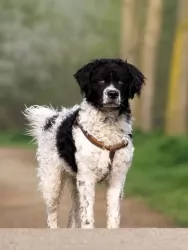 The Wetterhoun is a water dog developed in the 1500 or 1600s to hunt otters. The breed was developed by the Frisians in the Netherlands near the Northwest corner. In addition to catching otters in the lakes near by, they were also used as gundogs to hunt game. They are a fearless, tough and loyal working dog. They love the water and they are build for it with a waterproof coat and tight tail that is spiraled. They will swim happily in freezing cold weather as well.
The Wetterhoun is a water dog developed in the 1500 or 1600s to hunt otters. The breed was developed by the Frisians in the Netherlands near the Northwest corner. In addition to catching otters in the lakes near by, they were also used as gundogs to hunt game. They are a fearless, tough and loyal working dog. They love the water and they are build for it with a waterproof coat and tight tail that is spiraled. They will swim happily in freezing cold weather as well.
The Wetterhoun is rare and not seen outside of the Netherlands. Descendent of the Water Dog, that is now extinct, he is probably a relative of many spaniel types that also call the Water Dog their ancestor. Yet the Wetterhoun is not a spaniel or spaniel type.
The breed almost disappeared during World War II, like many others, they brought back and are now becoming more and more popular. The breed is only recognized by the Federation Cynologique Internationale and the United Kennel Club. AKC does not recognize them, but there are many hunting clubs and other registries that do. They are often promoted as one of the rare breeds.
 The Puli’s history is ancient, going back about 2,000 years. It is believed that Sumerians used Puli-type dogs to herd sheep thousands of years ago.
The Puli’s history is ancient, going back about 2,000 years. It is believed that Sumerians used Puli-type dogs to herd sheep thousands of years ago.
Ancient excavations show signs of Puli dogs. It is believed that Magyar tribesmen brought Pulis to Hungary for their herding abilities. The Puli was registered by the American Kennel Club in 1936, and the Puli Club of America was formed in 1951.
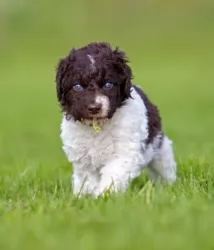 The Wetterhoun is a compact, medium sized breed weighing about 55 to 77 pounds. Great water dogs they are athletically built with low set ears hanging next to their heads, a waterproof coat, distinctive eyes with a very serious expression and a tightly curled tail held aloft over the back. Their coat is waterproof, somewhat oily, curly and thick. The fur is of a smoother texture on the ears, head, and legs. They can be solid black, solid brown, brown with white, or black with white.
The Wetterhoun is a compact, medium sized breed weighing about 55 to 77 pounds. Great water dogs they are athletically built with low set ears hanging next to their heads, a waterproof coat, distinctive eyes with a very serious expression and a tightly curled tail held aloft over the back. Their coat is waterproof, somewhat oily, curly and thick. The fur is of a smoother texture on the ears, head, and legs. They can be solid black, solid brown, brown with white, or black with white.
 The Puli is a medium sized dog from Hungary standing at between 36 an 45cm in height and weighing 10 to 13kg. He has always been a herding dog and his long,corded coat has been his trademark.
The Puli is a medium sized dog from Hungary standing at between 36 an 45cm in height and weighing 10 to 13kg. He has always been a herding dog and his long,corded coat has been his trademark.
The color of the coat can be black, white or cream but black is the color most seen with the Puli. The dog may well be a low shedder, but the coat is still going to need a lot of maintenance to keep it looking reasonable. It gets longer and longer and will need to be groomed to keep the cords neat and clean.
The Puli is an intelligent dog and it can be trained to respond to some simple commands. If the dog gets enough exercise, he can adapt to life in the country or in the city. As a herding dog he is used to being busy and will need walks, a run off his leash in the park and ball games.
They get on well with children and with other pets and are loyal to their owners and wary of strangers. They are highly active dogs these, and they just love playing games throughout their adult lives.
Because they are dogs which need a lot of exercise and space, they are more suited to life in the countryside as opposed to life on a small property in the city. They also make good faithful family guardians.
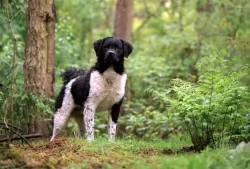 3.Adaptability – not a great apartment dog even though he is not that big. They need space. They need a job and they will finish their job at their own pace no matter what you say. It is impossible to train this trait out of them.
3.Adaptability – not a great apartment dog even though he is not that big. They need space. They need a job and they will finish their job at their own pace no matter what you say. It is impossible to train this trait out of them.
4.Learning ability Very high learning ability, very eager to learn and very smart. He is stubborn about finishing whatever job he is working on
 Your Puli is a self-confident, strong willed dog that is intelligent and can learn to be obedient and well mannered. They are also social and playful, and will love to be a family pet, being prepared to provide friendship and loyalty.
Your Puli is a self-confident, strong willed dog that is intelligent and can learn to be obedient and well mannered. They are also social and playful, and will love to be a family pet, being prepared to provide friendship and loyalty.
Because he has always been a herding dog, he takes his role of guardian and protector of his human family seriously. He makes a splendid pet if you’re ready to tackle the long coat which makes sure he doesn’t fit into the low-maintenance category.
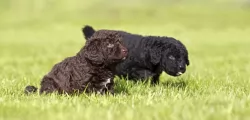 A hardy and healthy breed they do not have severe health issues. But like every his
A hardy and healthy breed they do not have severe health issues. But like every his
• Ear Infections – like any breed with hanging ears they can be prone to infection. This is particularly true because the dogs are in the water a lot. Be sure to clean and dry them after every water episode and inspect them on a regular basis even if the dog has not been in the water.
• Patellar Luxation – Knee cap issue with movement and inflammation. Can cause lameness and arthritis.
 Joints, eyes, and skin problems can cause problems with the Puli dog. Hip dysplasia is a problem with many dogs that can cause pain and also lameness.
Joints, eyes, and skin problems can cause problems with the Puli dog. Hip dysplasia is a problem with many dogs that can cause pain and also lameness.
Check your pet over with grooming sessions and make sure both the ears and eyes are free of discharge and redness.
The coat is thick and the Puli will require you to watch his skin for bacterial infections which can be caused by a lot of itching and scratching. Other common canine health issues to look out for are cancer and bloat.
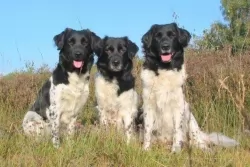 1Feeding the puppy -This is an active, hunting and swimming breed. They need good nutrition and high quality puppy food. A food formulated for active breeds or hunting dogs would be best. Feed your puppy in smaller amounts 3-4 times per day.
1Feeding the puppy -This is an active, hunting and swimming breed. They need good nutrition and high quality puppy food. A food formulated for active breeds or hunting dogs would be best. Feed your puppy in smaller amounts 3-4 times per day.
2.Feeding the adult - This is an active, hunting and swimming breed. They need good nutrition and high quality adult food. A food formulated for active breeds or hunting dogs would be best. Feed your adult twice per day.
4. Games and Exercises – This is an active working dog that needs a lot of exercise every day. A 30 minute walk is only the beginning. They need outdoor time to play and run. They need to swim if at all possible.
 Training and socialization is important for any dog and not just the Puli. Well trained dogs are a joy to have around – they are obedient and well mannered. The Puli is intelligent enough for you to train him yourself or you can have a professional trainer do it for you.
Training and socialization is important for any dog and not just the Puli. Well trained dogs are a joy to have around – they are obedient and well mannered. The Puli is intelligent enough for you to train him yourself or you can have a professional trainer do it for you.
The Puli is an athletic dog but you don’t want to start with any strenuous exercise with a young dog less than a year of age. Take your young dog for walks and give him some ball games. Only start more strenuous exercise later on to spare unnecessary pressure on the joints which could lead to hip dysplasia later on.
Every dog needs to be brushed and groomed to ensure its health. A dog like the Puli will need additional grooming because of the long dreadlocks for a coat. Many Puli owners prefer to have the hair cut short.
The coat of the Puli luckily doesn’t shed much but the coat, if you keep it long, will require a special wide tooth comb. You’ll need to check inside his ears, check that his eyes are bright without any discharge and also trim his nails.
You will have to check inside his mouth too. He can’t tell you if he has a rotten tooth that is painful and causing him to be sick. You need to regularly check his teeth.
It is important to know how much to feed your Puli. A healthy diet is so important for good health and a long life. All dogs have different appetites depending on their age, their breed, their size, the season of life they’re in and their activity levels.
It is better to feed your dog twice a day as opposed to one meal a day to avoid life threatening illnesses such as bloat. There are excellent commercially manufactured dog foods, but also bad ones, so you want to make sure that the kibble you choose is a high quality one with lots of vitamins and minerals.
You want to give him some home-made food too, keeping it simple and uncomplicated – the way dogs like it. Boiled chicken, brown rice or pasta and spinach, sweet potatoes and carrots are a healthy choice for your pet.
Chop it up and add it into the dry kibble a couple of times a week. Some raw meat added in from time to time will contribute to him being healthy. Never leave him without a constant source of fresh, cool water.